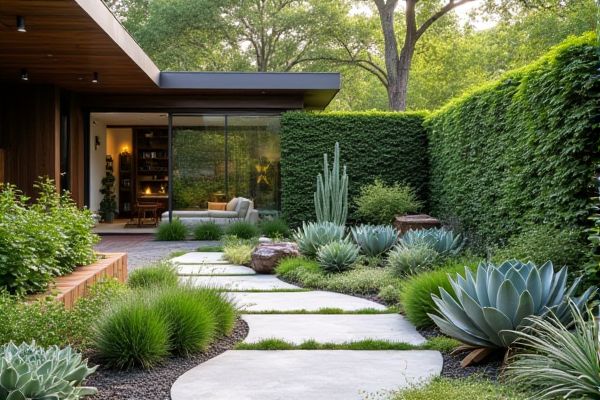
Succulent gardens require minimal water and maintenance, thriving in arid conditions with fleshy, drought-resistant plants, while flower gardens demand regular watering and care to support vibrant blooms and seasonal color diversity. Explore the benefits and challenges of both to decide which garden suits Your lifestyle and environment best. Read on to discover more about succulent and flower gardens.
Table of Comparison
| Feature | Succulent Garden | Flower Garden |
|---|---|---|
| Water Requirements | Low, drought-tolerant | Moderate to high |
| Maintenance | Low, minimal pruning | Moderate to high, requires deadheading |
| Sunlight | Full sun to partial shade | Varies by species, generally full sun |
| Soil Type | Well-draining, sandy or rocky soil | Rich, fertile, well-drained soil |
| Growth Rate | Slow to moderate | Fast to moderate |
| Lifespan | Perennial, long-lasting | Annual or perennial, varies |
| Climate Suitability | Arid, semi-arid climates | Temperate to tropical climates |
| Visual Appeal | Architectural, textured foliage | Colorful, vibrant blooms |
| Common Plants | Aloe, Echeveria, Sedum | Rose, Tulip, Daisy |
Introduction: Succulent Garden vs Flower Garden
Succulent gardens thrive in arid conditions, requiring minimal water and maintenance, making them ideal for drought-prone areas. Flower gardens offer vibrant seasonal blooms that attract pollinators and create dynamic visual interest through changing colors and scents. Your choice depends on whether you prioritize low upkeep and drought resistance or seasonal variety and floral fragrance.
Climate and Environmental Requirements
Succulent gardens thrive in arid, drought-prone climates with well-draining soil and minimal humidity, making them ideal for xeriscaping and water-conservation efforts. Flower gardens, in contrast, typically require richer soil, consistent moisture, and moderate humidity levels to support diverse blooms and seasonal growth cycles. Understanding these distinct environmental needs ensures optimal garden health and sustainability based on regional climate conditions.
Soil Types and Preparation
Succulent gardens thrive in well-draining, sandy or gritty soil that prevents water retention and root rot, often requiring minimal organic matter and excellent aeration. Flower gardens benefit from rich, loamy soil with balanced moisture retention and higher organic content to support nutrient-hungry blooms and promote robust root growth. Proper preparation for succulents involves amending soil with sand or perlite, while flower gardens typically need compost-enriched soil to enhance fertility and water-holding capacity.
Watering Needs and Drought Tolerance
Succulent gardens require minimal watering due to their natural ability to store water, making them highly drought-tolerant and ideal for arid climates. Flower gardens generally need more frequent watering to maintain vibrant blooms, as most flowering plants lack the water retention capabilities of succulents. Choosing a succulent garden over a traditional flower garden significantly reduces water consumption and maintenance in regions with limited rainfall.
Maintenance: Effort and Frequency
Succulent gardens require significantly less maintenance and watering frequency compared to flower gardens, thriving on minimal irrigation and occasional pruning due to their drought-resistant nature. Flower gardens demand more consistent attention, including regular watering, fertilizing, deadheading, and pest management to maintain vibrant blooms. The low effort and infrequent upkeep of succulent gardens make them ideal for drought-prone areas and busy gardeners seeking sustainable landscaping options.
Plant Variety and Color Palette
Succulent gardens feature a diverse range of drought-tolerant plants with unique shapes and textures, primarily showcasing shades of green, blue, purple, and occasional reds. Flower gardens offer a broader spectrum of vibrant colors, including reds, yellows, pinks, and whites, with seasonal blooms that attract pollinators. Your choice depends on whether you prefer the low-maintenance, sculptural appeal of succulents or the dynamic, colorful display of traditional flowering plants.
Year-Round Visual Appeal
Succulent gardens provide year-round visual appeal due to their drought-resistant nature and vibrant, diverse textures that remain attractive in all seasons. Flower gardens often bloom seasonally, requiring regular replanting to maintain color and interest throughout the year. Your choice depends on whether you prefer low-maintenance beauty or dynamic, seasonal color changes.
Pest and Disease Resistance
Succulent gardens offer superior pest and disease resistance compared to flower gardens due to their thick, water-storing leaves that deter many common pests. Flower gardens often require more pesticides and fungicides to manage frequent infestations and diseases caused by softer, moisture-rich foliage. Your choice between the two impacts maintenance effort, with succulents providing a low-maintenance option that naturally withstands many garden threats.
Cost and Budget Considerations
Succulent gardens generally require a lower initial investment and minimal ongoing maintenance costs due to their drought tolerance and slow growth, reducing the need for frequent watering, fertilizers, and replacements. Flower gardens often demand higher expenses for seasonal plants, regular irrigation, pest control, and fertilizers, increasing overall budget requirements. Choosing succulents can optimize long-term budget efficiency, especially in areas with water restrictions or limited gardening experience.
Which Garden Suits Your Lifestyle?
Succulent gardens require minimal watering and low maintenance, making them ideal for busy lifestyles or areas with water restrictions. Flower gardens typically demand more regular care, including watering, pruning, and pest control, suited to those who enjoy hands-on gardening. Your choice depends on how much time and effort you can dedicate to garden upkeep.
 homyna.com
homyna.com